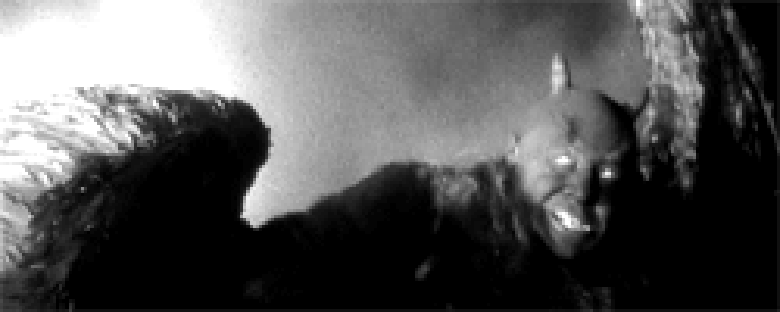Reviews
Eine deutsche Volkssage
F.W. Murnau
Germany, 1926
Credits
Review by Tom Huddleston
Posted on 08 October 2006
Source Eureka / Masters of Cinema DVD
Related articles
Features: 31 Days of Horror
The definitive cinematic retelling of the Faust legend, Murnau’s last and most lavish German silent was one of the earliest films to be subjected to that now familiar critical complaint: style over substance. The director was accused of selling his story short, of ignoring depth and cultural relevance in favour of flashy cinematic trickery and crude audience manipulation. And this consensus holds today; in critical studies the film is often overlooked in favour of Nosferatu or Sunrise, acknowledged masterpieces which rewrote the language of cinema, and in whose company Faust does indeed pale. But the film carries its own, equally persuasive pleasures: an epic sense of scale, and a giddy, almost tangible sense of boundaries being broken, exploring the infinite possibilities of a new, untested form.
Visually, Faust stands alone. Its depiction of an entire world under threat from malevolent forces has rarely been bettered, and there are images here which effortlessly retain their power to astound: Mephisto towering over the sleeping town, his black wings folded, pestilent smoke gushing from beneath his cloak to overpower the helpless villagers. Or Faust’s desperate flight from the crossroads, encountering Satan in various guises, each of them glaring at him with haunted, glowing eyes. Murnau chose to shoot much of the film with a static camera, allowing the action to be played out without embellishment. This gives the images on screen an unnatural, framed quality, like animated paintings, a window onto someone else’s nightmare.
The relevance of the story is inherent, both to contemporary and modern audiences: the story of a man who sells his soul, his integrity and his beliefs for the pursuit of transitory pleasure will never lose its significance. Murnau never overstates such aspects of the legend: Faust is far from an everyman, and his selection as test case for humanity’s capacity for faith seems arbitrary at best. The film gives us few reasons to side with the character: his compassion and despair in the opening sequences leads all too quickly to a renunciation of faith, and the devil’s bargain is struck surprisingly easily. As a (rejuvenated) young man Faust seems little more than a thrill seeker, plagued by doubt, perhaps, but more than willing to corrupt the innocent in his pursuit of pleasure. So here, perhaps, the critics are right—we never connect with the central character, he is an empty archetype, a faceless pawn in a much larger game, carried along by the story. But this is, as the original subtitle makes clear, a folk tale, and in a folk tale the hero is intentionally presented as a blank canvas, for the listener or viewer to project his own self- image.
It is the central section, in which Faust woos beautiful peasant girl Gretchen while Mephisto distracts her portly maiden aunt, which proved unbearable for Murnau’s critics. In fact the sequence clearly points the way towards Murnau’s next film, Sunrise, as a study of innocence corrupted, of love turned sour. Gretchen’s country idyll is invaded by Faust and Mephisto, and although the courtship is depicted as a light hearted romp the true nature of events is never far from the surface. There’s a discomforting (and presumably intentional) tonal conflict, Gretchen’s purity overcome by Faust’s lust, all underscored by the crass, bawdy nature of Mephisto’s pursuit. It all feels bizarrely modern, like a scene out of Swingers: the Devil as Faust’s wingman, keeping the chaperone occupied while our hero has his wicked way. But the emphasis on slapstick and romance, however effective in isolation, does jar violently with the rest of the story, both the preceding plague scenes and the deep tragedy into which the story now descends.
The final act is unrelentingly bleak. Following the death of her mother and her rejection by the townsfolk, Gretchen wanders alone with her illegitimate child. The child freezes to death, and Gretchen is accused of murder and sentenced to burn. In desperation she cries for Faust to save her, but he is too late and they are sacrificed together. Murnau pulls out all the stops, never flinching from the horror of Gretchen’s existence; we are with her all the way. The controversial happy ending is rather convenient, extolling the virtues of ‘Liebe’ (an emotion Faust himself never actually seemed capable of), but it serves to wrap up the story, and was doubtless appealing to downtrodden German audiences in the grip of terrible economic depression. The viewer is left a little confused and breathless, but nonetheless exhilarated.
The impact of Faust has echoed down the ages, informing epic cinema from Disney to Kurosawa and beyond: Mephisto’s towering form was lifted directly for the Bald Mountain sequence in Fantasia, and Faust’s ageing madness precisely anticipates Tatsuya Nakadai’s collapse in Ran. The soaring helicopter shots in Peter Jackson’s Lord Of The Rings trilogy were lifted almost directly from the night flight sequences here. The characters may lack definition and the story may be largely nonsensical, but Faust is pure cinema—bold, vibrant and thrilling.
We don’t do comments anymore, but you may contact us here or find us on Twitter or Facebook.



